|
|
|
Sort Order |
|
|
|
Items / Page
|
|
|
|
|
|
|
| Srl | Item |
| 1 |
ID:
181993
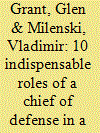

|
|
|
|
|
| Summary/Abstract |
New democracies face significant difficulty in understanding the position of the Chief of Defense (CHOD) and its difference from the traditional/historical role of Chief of the General Staff (CGS). Many of those states attempted to transition from CGS to CHOD upon the advice from Western allies. This move usually followed critical failures in the defense systems. These failures often occurred after bad political decisions regarding the armed forces because the political leadership was in the dark about their true condition. The role of the CHOD, as envisaged and implemented in most long-standing democracies, is designed both to solve this deficiency and to ensure that the armed forces are fit for the future. This article outlines how and why this is the case and identifies precisely what it is that a CHOD should do.
|
|
|
|
|
|
|
|
|
|
|
|
|
|
|
|
| 2 |
ID:
182037


|
|
|
|
|
| Summary/Abstract |
Resurgent expressions of an “action-reaction” arms race narrative and its corollary “inaction-inaction” narrative are the basis for frequent assertions that if the United States would only stop its nuclear programs, opponents would also stop building their nuclear force—and a “peace race” would ensue. In other words, U.S. efforts to maintain its deterrence capabilities are seen as sparking or accelerating the “arms race.” This argument has its roots in the 1960s; it has not changed since then. This same claim is now leveled at the contemporary and much-delayed U.S. nuclear modernization program. As in the past, the claim now commonly expressed is that current U.S. efforts to preserve its strategic deterrence forces are the cause of a new action-reaction arms race cycle and should, therefore, be stopped. However, history disproves the action-reaction/inaction-inaction narrative. An examination of numerous documents regarding the development of U.S. strategic policy—including now-declassified governmental and unclassified non-governmental studies and books that that have closely examined this issue—and interviews with a bipartisan group of former officials and knowledgeable academics demonstrates the flaws in this narrative and sets the record straight regarding U.S. policy developments and the factors that drove those developments.
|
|
|
|
|
|
|
|
|
|
|
|
|
|
|
|
| 3 |
ID:
182014


|
|
|
|
|
| Summary/Abstract |
It may seem odd including two articles in this issue on special operations given Colin Gray’s scholastic contributions to and output on a range of weightier subjects discussed in this issue, including strategy, geopolitics, deterrence, missile defense, and strategic culture. While he will be best remembered for his contributions to these subjects specifically, and to the academic field of strategic studies more generally, Colin was very much interested in and wrote several works on the subject over his remarkable career. This article makes the claim that few subjects better illustrate who Colin was, intellectually and personally, than his contributions to the “field” of special operations. Whether the reader accepts that special operations comprise a field of study is a moot point. The fact remains Colin was very much interested in the subject and wrote on it at different points in his extraordinary career. To provide structure to this short retrospective this article categorizes Colin’s contributions to the study of special operations: as a pioneer, as a pilgrim, and, ultimately, as a pragmatist.
|
|
|
|
|
|
|
|
|
|
|
|
|
|
|
|
| 4 |
ID:
182031


|
|
|
|
|
| Summary/Abstract |
The following essay will serve as a historical case study on sound theory as the basis of strategic decision making. The argument is that Helmuth von Moltke the elder undertook a systematic transformation of the Prussian force structure to make his wars approximate Carl von Clausewitz’s philosophical abstraction of absolute war. That is, he sought to reorganize the Great General Staff (GGS) to produce an instantaneous discharge of force, both immediate and decisive in its results. In doing so, he produced a military strategy to overcome the geopolitical perils inhering in the nascent Prusso-German state, resulting ultimately in the unification of Germany. We then briefly relate the deductive lessons on the relationship between strategic theory and practice evidenced by Moltke to the contemporary crisis of Anglo-American theory.
|
|
|
|
|
|
|
|
|
|
|
|
|
|
|
|
| 5 |
ID:
182002


|
|
|
|
|
| Summary/Abstract |
Professor Colin S. Gray dedicated his life to a careful examination of international relations and factors that influence states’ foreign policy and defense choices, among other topics in his excellent scholarship. He was keenly aware of limits of historical understanding for making too confident statements about what the future holds,1 yet Professor Gray’s writings leave one impressed with his prescience. “The future is the past in the ways that matter most,” he wrote in one of his publications and one cannot but think there is a lot of truth to that statement.2 Professor Gray’s selected thoughts on nuclear arms races and arms control, with which this article is concerned, are but a sliver of his extensive and most impressive scholarship on a variety of national security topics.
|
|
|
|
|
|
|
|
|
|
|
|
|
|
|
|
| 6 |
ID:
182039


|
|
|
|
|
| Summary/Abstract |
Geopolitics plays a decisive role in the international politics. The importance of geopolitics can be seen in the Twentieth century that culminated in the First Word War. The Berlin-Baghdad Railway Project was the true manifestation of geopolitics, while the Balkan region played a significant role due to its geopolitical and geo-strategic importance. The Balkans being at the crossroads of great powers became a catalyst for animosity among them. Geopolitics has again taken a centre stage in the Twenty-first century due to China-led Belt and Road Initiative (BRI) and its flagship project i.e., China-Pakistan Economic Corridor (CPEC). The paper intends to investigate, analyse, and predict the BRI’s flagship belt i.e., CPEC and its likely impacts on the existing rivalry between China and the United States under the prism of Neo-Realism.
|
|
|
|
|
|
|
|
|
|
|
|
|
|
|
|
| 7 |
ID:
181991
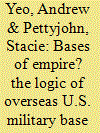

|
|
|
|
|
| Summary/Abstract |
Was the expansion of overseas U.S. bases from the late nineteenth century to the present driven by imperial impulses or strategic principles? Recent scholarship reflects a diverse set of perspectives on the history and politics of overseas U.S. military bases. To evaluate existing claims about the evolution and logic of overseas U.S. bases, we establish a conceptual framework for understanding an “empire of bases” based on motivational and relational attributes of basing policy. We then examine different historical junctures in the development of the U.S. overseas base network and analyze macro-level trends in basing policy.
|
|
|
|
|
|
|
|
|
|
|
|
|
|
|
|
| 8 |
ID:
181995
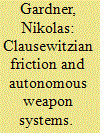

|
|
|
|
|
| Summary/Abstract |
In the 1990s, Barry Watts assessed the impact of modern technology on the incidence of general friction in warfare, concluding that the participation of humans in wars made friction nearly impossible to eliminate. The advent of autonomous weapon systems (AWS), however, has the potential to reduce the role of humans significantly. This article considers the impact of AWS on the incidence of friction in future wars. Using Watts' taxonomy of general friction as an analytical tool, it argues that while these weapons have the potential to reduce friction resulting from human limitations, they will likely increase informational uncertainty, and unintended escalation.
|
|
|
|
|
|
|
|
|
|
|
|
|
|
|
|
| 9 |
ID:
182032
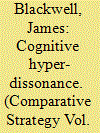

|
|
|
|
|
| Summary/Abstract |
Military Exercises provide practice in the art of war; they also send messages of political resolve. The Cold War record of signaling nuclear intent through military exercises reveals that most of the time both sender and receiver misperceive each other’s messages. Today’s nuclear armed states must design their exercise programs to communicate the messages they want others to understand.
|
|
|
|
|
|
|
|
|
|
|
|
|
|
|
|
| 10 |
ID:
182000
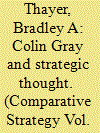

|
|
|
|
|
| Summary/Abstract |
The history of strategic thought is replete with contributors to the scholarly understanding of definitional issues of strategy and its application in various domains or to specific subjects. In any consideration of a strategic pantheon, Colin Gray ranks as a foremost strategist due to his contribution to the study of strategy from the perspective of theory, history, and policy. His contributions to strategy may be compared to Samuel Huntington’s in the related discipline of political science. As Huntington made a major impact in each subdiscipline of political science, so Gray’s contributions to strategy were comparable and thus define him as a major strategist: he developed a theory of strategy; analyzed strategy and conflict in a contemporary and historical context; made many contributions to nuclear and conventional strategy; helped to demarcate strategy as the object of scholarly study; and as a discipline to be taught. In each of these fields of study, Gray perceived what was generalizable over time and what was not.
|
|
|
|
|
|
|
|
|
|
|
|
|
|
|
|
| 11 |
ID:
182009
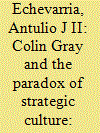

|
|
|
|
|
| Summary/Abstract |
As Colin Gray’s colleagues and friends well know, he invested considerable intellectual energy into championing the concept of strategic culture. His affinity for it traces to his 1981 article in International Security which described “national style” as derivative of strategic culture.1 However, his interest in it waned after the first decade of the twenty-first century. In fact, Colin’s 2006 SAIC paper, Out of the Wilderness: Prime Time for Strategic Culture, may well be the culminating point of his thought on the topic.2 It is a curious paper, in any case. It claims strategic culture is “vitally important” and admits to “no persuasive arguments to the contrary;” nonetheless, its core is a discussion of eleven of the concept’s “perils and pitfalls” which together amount to just such an argument.3 Colin could, of course, work both sides of an argument better than almost anyone. Indeed, he could promote dialectically opposing points of view simultaneously and artfully.
|
|
|
|
|
|
|
|
|
|
|
|
|
|
|
|
| 12 |
ID:
182015
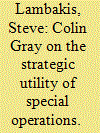

|
|
|
|
|
| Summary/Abstract |
The challenges Colin Gray faced to publish a fully fleshed out analysis of the contribution made by special operations to defense and security were many. James Kiras runs through his different efforts across the year in a nearby tribute. Colin believed that the best way to understand the strategic utility of special operations was to look at it through the lens of history, and, as one who worked closely with him on his project, I would like to lay out what I believe were his most significant insights on this subject and look at what might be called his pioneering, and sadly unpublished, work on the subject: Special Operations: What Succeeds and Why.
|
|
|
|
|
|
|
|
|
|
|
|
|
|
|
|
| 13 |
ID:
182019
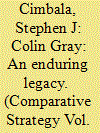

|
|
|
| 14 |
ID:
182007
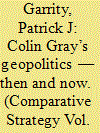

|
|
|
|
|
| Summary/Abstract |
In 1977, America seemed adrift in the world. The Vietnam War had soured many on its post-World War II internationalist foreign policy. The new president, Jimmy Carter, proclaimed that the United States must overcome its inordinate fear of communism, reduce military spending and overseas commitments, focus on international human rights, and become a much more restrained power. From this perspective, the massive nuclear arsenals of both sides rendered any sensible resort to war impossible, a reality which should be driven home diplomatically through stabilizing arms control agreements and practices.
|
|
|
|
|
|
|
|
|
|
|
|
|
|
|
|
| 15 |
ID:
182003
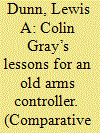

|
|
|
|
|
| Summary/Abstract |
I am very pleased to participate in this Symposium in honor of Colin Gray. I first met Colin over four decades ago in the mid-1970s when he had just arrived at the Hudson Institute from England. I also was a younger staff member at Hudson. Over the decades, Colin’s career went off in one direction – strategy and defense policy and posture – and my own in another – nuclear nonproliferation and arms control. We and our families remained friends – and every now and then we saw each other.
|
|
|
|
|
|
|
|
|
|
|
|
|
|
|
|
| 16 |
ID:
181998
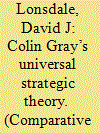

|
|
|
|
|
| Summary/Abstract |
As is evident from this current volume, Colin Gray made substantial theoretical contributions to a wide range of strategic subjects. The Leverage of Sea Power, Airpower for Strategic Effect, and Nuclear Strategy and National Style are just three of his major contributions to important subsets of the discipline Strategic Studies.1 Underpinning all of his work, however, is Colin’s appreciation of the process of strategy in general. In this way, Colin’s wider contributions were grounded in his universal strategic theory; that theory that applies to all strategic activity regardless of time, place, belligerent, technology or domain. Universal strategic theory enables us to unlock the core elements and process of strategy. Over the decades, Colin developed his universal theory in a number of key works: War, Peace & Victory, Modern Strategy, The Strategy Bridge, and Theory of Strategy.2 Indeed, Colin set himself the task, every 10 years or so, of writing a work with universal elements. In this way, he was able to reflect upon his own evolving appreciation of the subject.
|
|
|
|
|
|
|
|
|
|
|
|
|
|
|
|
| 17 |
ID:
182008


|
|
|
|
|
| Summary/Abstract |
Colin Gray has made extraordinary contributions to modern strategic thought. His clear thinking and evidence-based argumentation help understand why he has been such an influential commentator on issues that are of enduring concern to policymakers as well as analysts. His contributions to our understanding of key issues of nuclear stability as the Cold War reached a crescendo will be recognized as of enduring importance to bringing the Cold War to a peaceful conclusion. His 1977 volume, The Geopolitics of the Nuclear Era introduced geopolitics to a subject that many had thought had repealed geographic and geopolitical considerations from the policy discourse.
|
|
|
|
|
|
|
|
|
|
|
|
|
|
|
|
| 18 |
ID:
182004
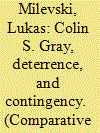

|
|
|
|
|
| Summary/Abstract |
Most scholars as well as practitioners in strategic studies recognize that deterrence is contingent upon the opponent choosing to be deterred. This recognition was a contribution made by Colin Gray to deterrence theory, forcefully if not strictly uniquely, on the basis of the theory of strategy. Although relating the nature of strategy to deterrence led to a powerful reinterpretation of the importance of actor agency in deterrence, it is nonetheless still an incomplete, albeit foundational, appreciation of agency and contingency. To understand fully the role of agency in deterrence, one must also relate it to the nature of political relationships, and thereby identify another contingency point in deterrence.
|
|
|
|
|
|
|
|
|
|
|
|
|
|
|
|
| 19 |
ID:
182023


|
|
|
|
|
| Summary/Abstract |
“Compellence” as a causal variable is an over-simplification to understanding success or failure in military conflict. The varieties of compellence are not homogenous. It worked in World War II but failed in Vietnam. But, this tells the strategist little about how to organize future operations. The vocabulary of strategy matters. This article seeks to increase the specificity of the compellence ways-ends logic chain based on variations in method and direct effects. The article operationalizes compellence into six categories across a spectrum from destruction to psychological impact: annihilate, exhaust, deny, decapitate, intimidate, and subvert.
|
|
|
|
|
|
|
|
|
|
|
|
|
|
|
|
| 20 |
ID:
181990
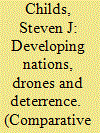

|
|
|
|
|
| Summary/Abstract |
Ensuring the survivability of second-strike nuclear forces is critical for strategic stability, yet some scholars contend that technological changes in surveillance by established nuclear powers are reducing their survivability in a new era of counterforce. What are the implications of the proliferation of unmanned aerial vehicles (UAVs) on deterrence between small nuclear powers (SNPs)? Would these systems allow SNPs to appreciably increase their confidence in counterforce targeting? This article examines developments in the India–Pakistan dyad to consider how the proliferation of UAVs to SNPs might alter the decision calculus regarding preemptive strikes.
|
|
|
|
|
|
|
|
|
|
|
|
|
|
|
|
|
|
|
|
|